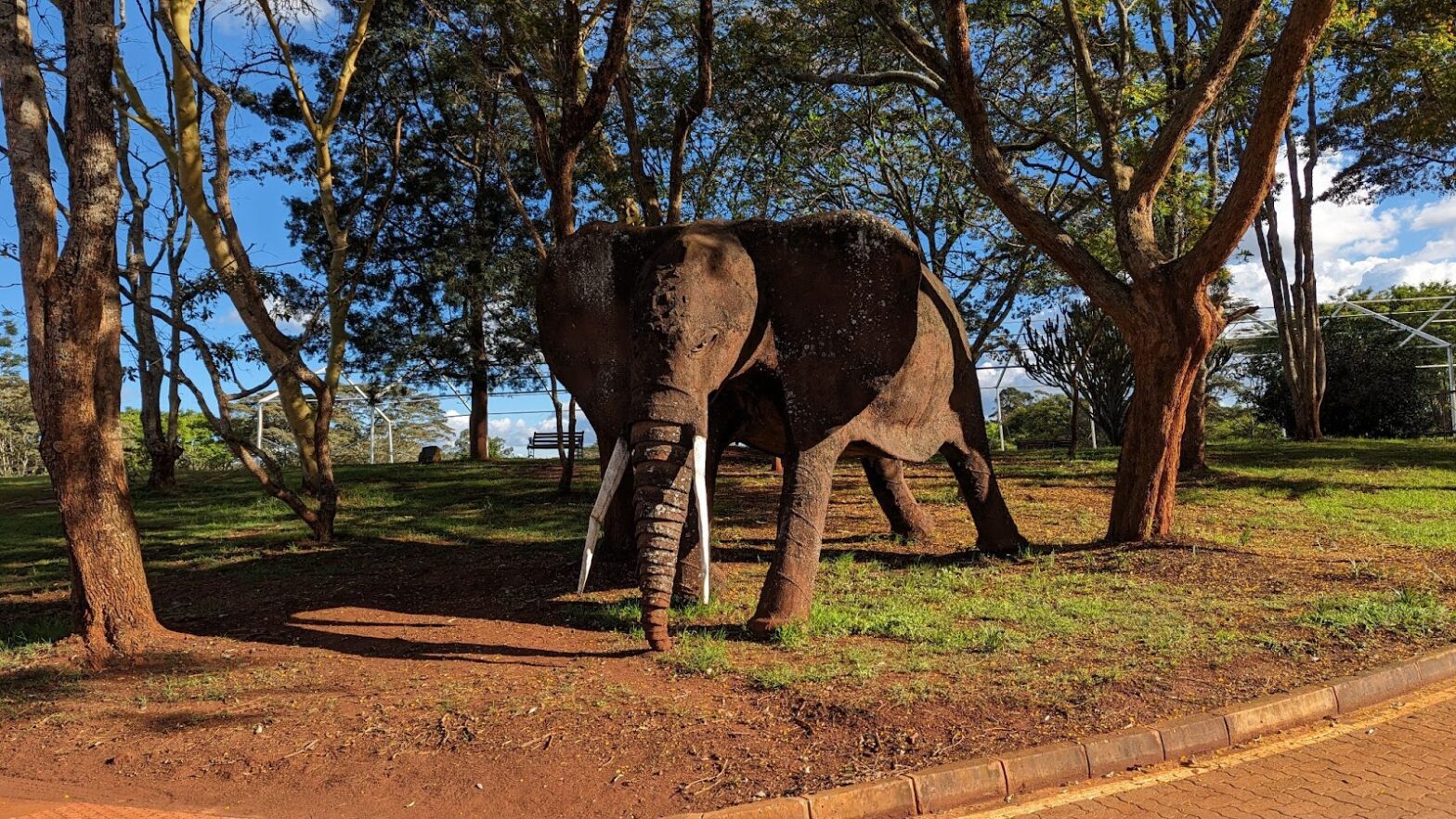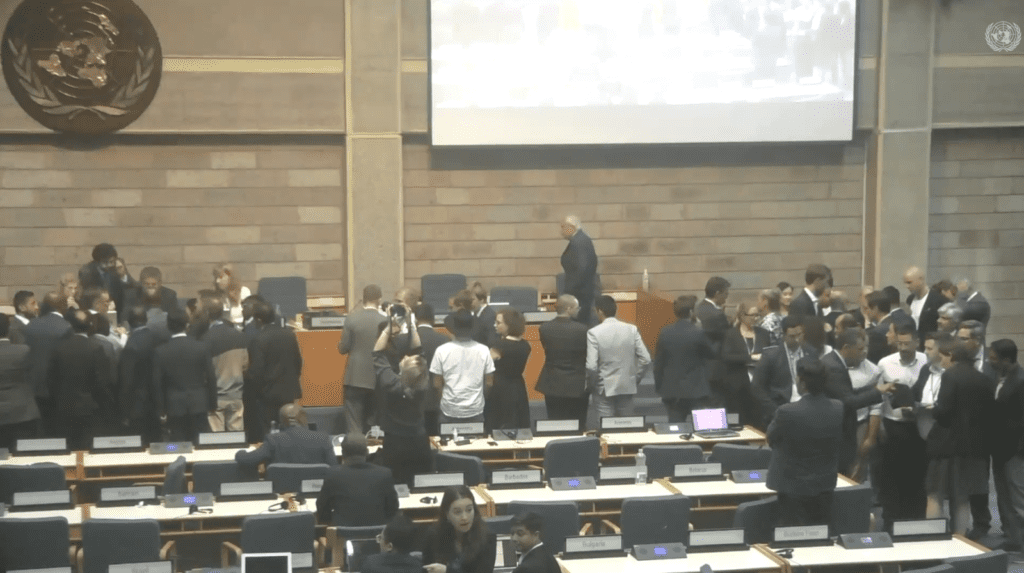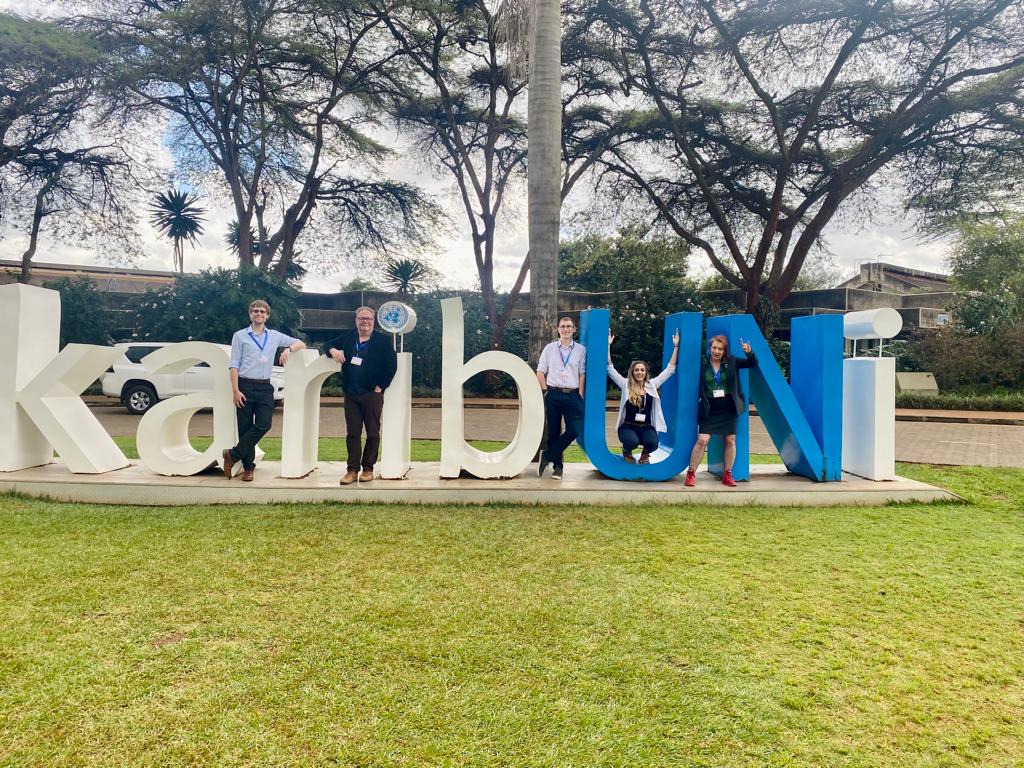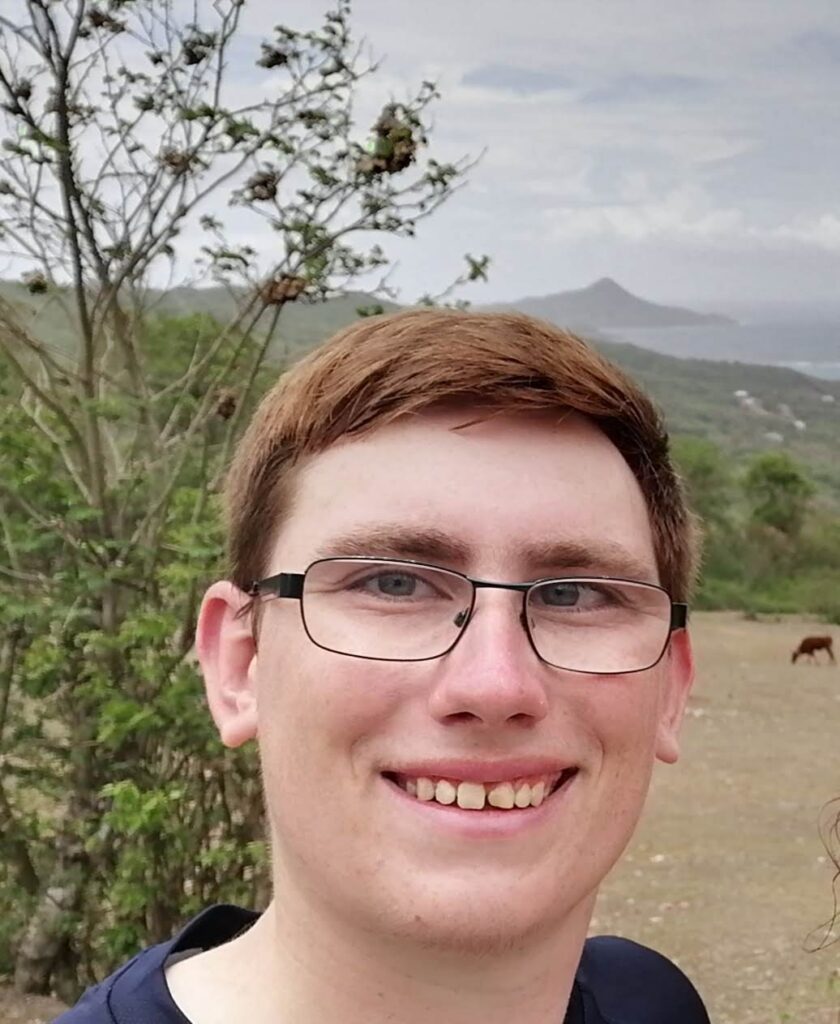As INC-3 closed, the ‘Nairobi Spirit’ faltered and Members are now forced to address the elephant in the room

Artwork in the UNEP compound. Photo by Sam Winton.
As time is called on the INC-3 negotiations in Nairobi to build the first global plastics treaty, much has been achieved but the stances of opposing coalitions remain as implacable as ever. The lack of a mandate for intersessional work puts a heavy burden on INC-4 and 5 in Canada and Korea to build a sufficiently strong and robust treaty. Sam Winton sums up the week’s successes and failures and looks to the road ahead.
After a frantic final weekend where Plenaries and Contact Groups have commenced, adjourned, overrun and finally signed off, we have now concluded the third session of the Intergovernmental Negotiating Committee to end plastic pollution in Nairobi, Kenya. While I have been following from afar today as my (significantly delayed) flight has returned me to Portsmouth, I have kept up to date through live-streamed Plenaries and social media updates on Contact Groups.
Stocktaking Plenary and INC-4 and INC-5 confirmed
A morning stocktaking Plenary took place to report on the work of the Contact Groups. While Contact Group 1 had completed their work, Contact Group 2 needed time to validate the merged proposals and Contact Group 3 still had significant discussions to conduct on intersessional work, and agreeing a mandate for the secretariat to prepare a revised draft text based on the compilations assembled by each Contact Group. Please read the Co-Facilitators summaries for further information. After a brief session, the Plenary adjourned to allow the Contact Groups to complete their work. Contact Group 2 were able to do this rapidly, but with Contact Group 3 overrunning, the 4pm Plenary was delayed until 6pm. As this time passed with Contact Group 3 still deep in discussion, the Plenary briefly reconvened to address organisational matters.
At INC-1, when Ambassador Meza-Cuadra was elected as chair, it was with the agreement that he would step down at the close of INC-3 and be replaced by Ambassador Luis Vayas Valdivieso of Ecuador. After hearing no objections, Ambassador Luis Vayas was duly elected by the committee and will take over as chair after the conclusion of INC-3. Additionally it was confirmed that Ottawa, Canada would host INC-4 over a seven day period between the 21st-30th April 2024 and Busan, Republic of Korea would host INC-5 between 25th-1st December 2024. The plenary was subsequently adjourned again to allow Contact Group 3 to complete its work.
On resumption at 20.40, Contact Group 3 reported that a mandate for a revised draft to be compiled and released by the 31st December 2023 had been successfully agreed, a decision which was ratified in plenary at 20.45. However the Co-Facilitators reported that an agreement for intersessional work had still not been agreed.
INC-3 closes with no consensus reached for intersessional work
When the plenary finally resumed at 22.20 the Chair invited the Co-Facilitators of Contact Group 3 to report on the work to agree a mandate for Intersessional Work. A visibly emotional Mr. Danny Rahdiansyah reported that no consensus could be reached meaning that no formal intersessional work can take place between INC-3 and the commencement of INC-4 in April. Having attended multiple sessions chaired by Mr Rahdiansyah and his Co-Facilitator Ms. Marine Collignon, it is important to recognise the heroic efforts they have made in their attempts to secure consensus. The failure of the Members to reach a consensus should in no way reflect on their work and I am sure all high ambition stakeholders appreciate their dedication.
After a number of closing statements had been made, the United States made a late effort to reopen the issue, stating that they believed that the Members had been close to a consensus. However Russia objected, citing rules of procedure, while Saudi Arabia also objected, commenting on how they had ‘tried hard to reach a consensus and members understood each other better than ever’. Under the draft rules of procedure which are being provisionally applied, the Chair had no choice but to close the matter. After reading final procedural matters the third session of the Intergovernmental Negotiating Committee was closed at 23.04.

Summing up the successes and challenges of INC-3
For 6 days, this had been an almost eerily successful week of progress when set against the shadows of Paris, with negotiations conducted in the ‘Nairobi Spirit’ of co-operation and multilateralism. There has been a successful first reading of the Zero Draft, with some areas of consensus found, and Members have had the opportunity to make their first round of revisions to the Zero Draft text. Numerous topics have been covered including an unprecedented focus on a just transition including the rights of waste pickers and other informal workers. The biggest challenge in this regard will be to ensure that a just transition is truly integrated throughout the Treaty and the text does not only pay lip service with no substantive measures. Additionally, many Members are discussing reuse and other disruptive trade models as an alternative to single use consumerism.
A range of groups of Members have begun to operate as blocks to unify their voices in the Treaty. The Africa Group have been notably consistent in their calls for an ambitious treaty, while calling for developing countries to receive the financial and technical support they will require. The group have also been unanimous in their calls for the Secretariat of the Instrument to be hosted at UNEP HQ in Nairobi, highlighting the regional commitment to tackling plastic pollution. AOSIS and PSIDS have worked as a group to advocate for the special circumstances of SIDS to be recognised and represent their common interests in negotiations. This point brings me onto the most glaring inequality I have observed at INC-3 which is the extreme differences in the size of national delegations. While some delegations have 5-10 negotiators in addition to support staff, others have only 1 or 2 people who have to cover 3 sessions a day, often with 2 simultaneous Contact Groups running. While the Chair and Secretariat have attempted to walk an extremely fine balance between making sufficient progress and recognising the limitations of smaller delegations, it is obvious that some Members are at a significant disadvantage. Nonetheless, the smaller delegations have been impressive, both in supporting each other where interests align, and advocating strongly for their rights to participate fully in the process, without ever acting as a block to progress being made.
However, it was impossible to avoid the feeling that this week has had challenges. While it would be naïve to expect full agreement between member states at this stage, the depths of some divisions are concerning. The Like Minded-Group of countries have acted with an extremely unified voice and it is difficult to see how some areas of division will be overcome. Notably, a consistent argument used by the Like Minded-Group has been a rejection of any Provision which they interpret to interfere with global trade. The Group usually cites Rio Principle 12 which states: ‘Trade policy measures for environmental purposes should not constitute a means of arbitrary or unjustifiable discrimination or a disguised restriction on international trade’. The group also frequently references WTO jurisdiction along with the jurisdiction of other MEAs as a reason for a particular Provision being unnecessary.
There is also significant disagreement about where the plastic life cycle begins. The High Ambition Coalition, Scientists Coalition and most other stakeholders believe that the life cycle begins when raw materials are extracted from the ground. However the Like Minded-Countries believe that the life cycle begins when a plastic product is produced or designed. If the Like Minded-Group were to win these arguments, it would mean that many upstream plastic pollution measures, crucial for the success of the treaty, may be excluded including measures such as banning problematic polymers and chemicals of concern, caps on production, and preventing the trade in plastic waste. There is also an effort from the Like Minded-Countries to argue that Polymers are not pollutants, removing them from the scope of the treaty, a move which would further impact upstream measures. These measures are critical because despite the arguments of some Members, plastic pollution cannot be tackled by waste management alone.
While the ‘Nairobi Spirit’ has been fully present in discussions this week, it was always likely to be this final day where the elephant in the room wreaked havoc. As Contact Group 3 met late into last night and again continued to prolong their discussions today it became increasingly clear that we were getting uncomfortably close to failing in one of the two core objectives in this meeting, to secure a mandate for intersessional work, an outcome which makes it extremely difficult to see a path to an ambitious Treaty by the end 2024. Ultimately this is a failure of an INC process in which the requirement for consensus means that one or two countries can entirely derail the process if they choose.
The road ahead for a global plastics treaty
We only have 14 days of INC discussion remaining across two sessions and divisions are concerningly wide. What matters now is the ability of members to converge over the remaining two sessions of the committee. Time is short and the rejection of intersessional work, along with Members still calling for discussion of key issues to be delayed until a later date further increases the time crunch. It is now looking increasingly likely that this process will come down to the wire and that ultimately some outcomes we want to see will not be reflected in the final Instrument. The High Ambition Coalition must now consider radical changes in their approach to ensure that this INC process does not fade into failure. There may come a time when the High Ambition Members have to reflect on whether a strong treaty with some countries choosing to stay behind is a better approach than a weaker treaty with full consensus. Now is definitely the time to try and fix the draft rules of procedure which allow this stalling of progress to occur. Members may also need to consider an Instrument design that is flexible with a start and strengthen approach.

Carrying the Nairobi Spirit forward to the next negotiations
Overall much disagreement still exists between Members. The original 31 page zero draft has now grown to over 100 pages with members’ submissions making the text extremely challenging to work with. This was to be expected to a degree, with this session of the INC being the first chance for Members to input on a legal text, but with further time now lost there is extreme urgency to resolve these issues. The mandate for a revised draft text must give us hope that when the dust of tonight’s disappointment settles, we can still deliver a revised draft text which is ambitious, addresses the full life cycle of plastic (not just waste management), and truly puts us on a path to tackling plastic pollution. It is now up to all Members and stakeholders to uphold the ‘Nairobi Spirit’ which had served us so well early this week and carry it forward to Ottawa and Busan, this time with renewed determination and vigilance against the tactics used tonight.
In his closing remarks the outgoing Chair Ambassador Meza-Cuadra stated that ‘the eyes of the world are on us’ and quoted Nelson Mandela in saying ‘Sometimes it falls upon a generation to be great. You can be that generation. Let that greatness blossom’. Unfortunately we can do little more than hope that the Members who blocked real progress tonight will reflect on those words.
Author’s note
This is the final edition of my blog series at INC-3. I thank all readers for following my first attempt at a blog series like this. The comments I have received from people online and in Nairobi have been extremely heartening and I hope that the blogs have been useful or at the very least interesting for you to read. I will be following the Plastics Treaty Process through to its completion and may produce blogs like this at upcoming INCs. If I could make one request it would be for you to follow some of the excellent work that my colleagues at the Universities of Portsmouth and Surrey do in the Plastics Governance space. The University of Portsmouth runs the Global Plastics Policy Centre, an excellent hub for plastics policy reviews and all things related to the Global Plastics Treaty, including Policy Briefs on key topics. We also have Revolution Plastics, our focal point for all plastics research at the university. The Surrey Centre for International and Environmental Law serves as the home for interdisciplinary research on international and environmental law and policy at the University of Surrey. The University of Surrey also jointly runs the Governing Plastics Network.
Author biography

Sam Winton is a postgraduate researcher who has worked in the Revolution Plastics team at the University of Portsmouth since its creation in 2020. Sam recently commenced a PhD ‘Exploring the development and outcomes of the global plastics treaty’ at the University of Portsmouth and the University of Surrey. Sam also works with the University of Portsmouth’s Global Plastics Policy Centre (GPPC) researching stakeholder views of the treaty process to date.
With a background in environmental hazards and community preparedness, Sam’s main research focus is working with communities and a broad range of stakeholders to tackle environmental challenges. He has also conducted work with international organisations with a view to creating policies to tackle the global plastics problem, and facilitate sustainable development.